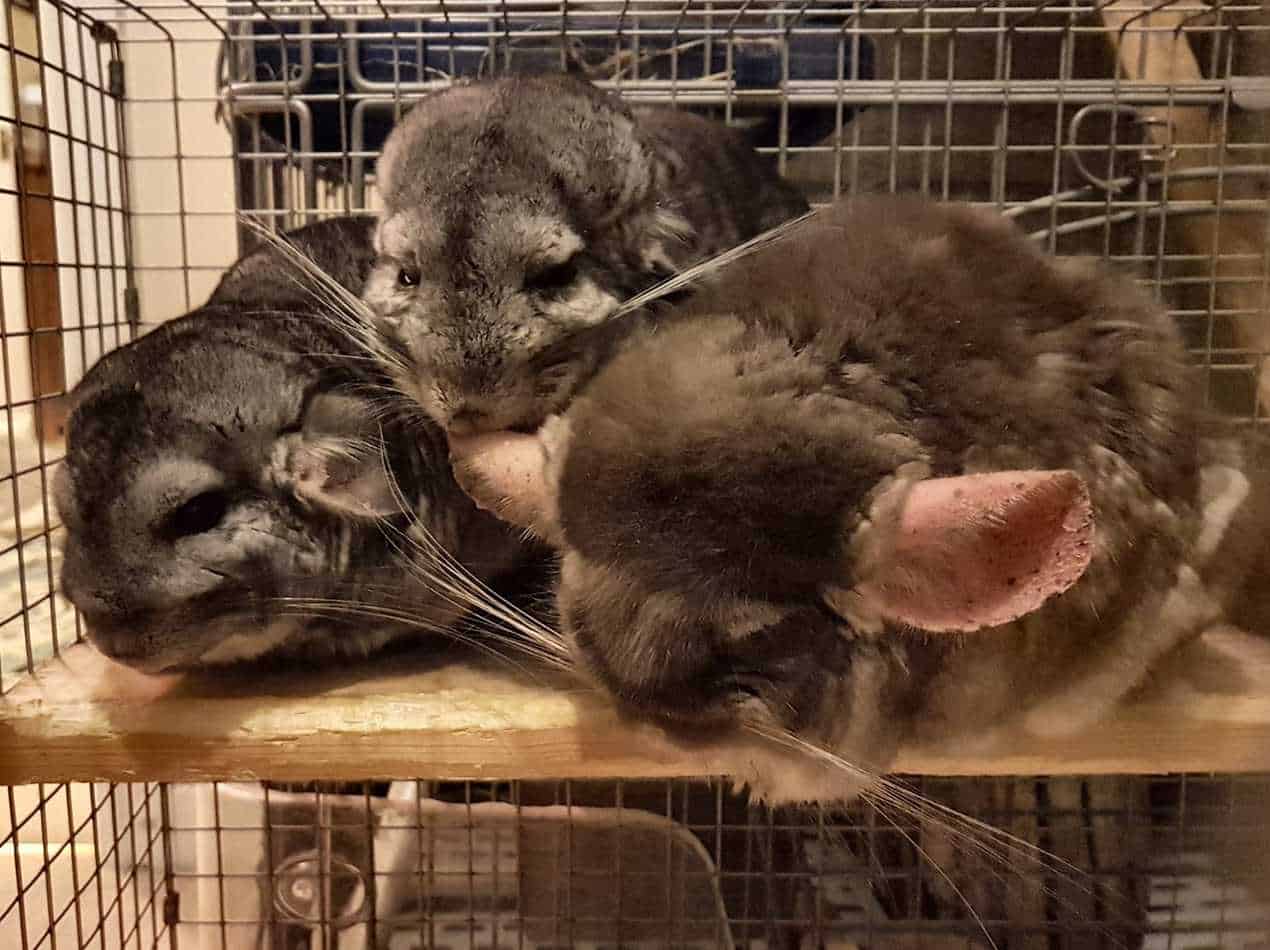Chinchillas are not designed for sugar or fatty foods as these foods can cause severe digestive problems.
Can chinchillas eat rabbit food? Rabbit food should never be given to a chinchilla as they have different dietary requirements. Feeding your chinchilla the wrong food can make them ill.
Chinchillas have a strict diet of hay and small amounts of dried grass pellets. It’s vital that you feed your chinchilla the correct diet as they have a sensitive digestive system.
What Should You Feed Pet Chinchillas?
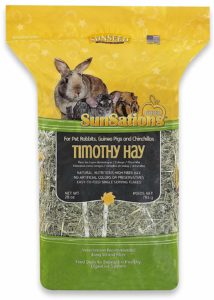
Chinchillas are herbivorous creatures. Their diet requires a large amount of grass. The main foods they eat are:
- Timothy Hay (or other types of hay)
- A handful of grass-based pellets per day
- A small amount of treats
Their diet is rich in roughages and low in sugar and treats.
In their natural habitat, chinchillas love to chew and eat the bark of trees and berries and fruits but DO NOT feed this to your pet chinchilla as their diet requirements are completely different.
Doing so can make your chinchilla serious ill.
If your chinchillas don’t consume enough fibers, their teeth could overgrow, which could result in fur chewing and affect their digestion system.
Excess fat content can damage the liver. Chinchillas feed on different types of vegetation, but lush plants can affect their stomachs.
You must regulate the quantity of food you give them.
Hay is extremely important to chinchillas and should make up most of their diet.
Their digestive system requires grass and hay to remain healthy.
Chinchillas also need to have a constant supply of clean water. Otherwise, they can become sick.
Use a drinking bottle to keep the water clean and check daily to make sure nothing is blocking the water from coming out of the bottle.
For more information on chinchilla diet requirements, consider checking out our full in-depth chinchilla eating guide.
What Fruits and Vegetables Can Chinchillas Eat?
Consider giving your chinchilla fruits and vegetables up to four times a week. Excessive fruits and vegetables can make your chinchilla ill as their digestive system will have a hard time breaking the sugars and fats down.
Here is a list of vegetables that your can eat chinchillas:
- Carrot
- Kale
- Alfalfa
- Celery
- Potato
- Sweet potatoes
- Squash
Give them fruits but only as treats as they are rich in sugar. Fruits to consider are:
- Apples
- Blueberries
- Grapes
- Raisins
What Treats Do Chinchillas Like?
Chinchillas like small amounts of root veggies and dried fruits such as sultanas, raisins, and carrots. Have a look at the list above and below for more ideas, or check out our healthiest chinchilla treats and foods article.
Seeds and nuts are not recommended as treats as they have very high-fat content which can make your chinchilla serious ill.
Chinchillas can become severely ill if they eat fatty foods. Avoid giving them foods that will jeopardize their health and wellbeing.
You should be monitoring the number of treats you give your pets. Too many treats can increase their chances of weight gain and illnesses.
Their stomachs are sensitive so treats should be given in moderation. Too many treats can cause diarrhea.
Here is a list of treats you can give your chinchilla:
- Dried fruits such as dried banana, apple, rose hips, blueberries, pineapple, strawberries, peach, raisins or cranberries
- Small pieces of fruits such as grape, pear, apple or kiwi
- Vegetables and greens such as carrot, dandelion leaves, parsley, romaine lettuce orchard.
- Grains such as rolled oats, plain shredded wheat or oat groats
- Commercially available alfalfa-based animal treats
- Dried herbs such as mint, oregano, raspberry leaves, nettle, comfrey or dandelion leaves
Keep in mind these foods must be given sparingly and in small amounts because they are not good for your chinchilla’s health.
Hay and grass-based pellets are what your chinchillas need. Most of the treats discussed above contain high amounts of sugar and fats.
If you give your chinchillas any of these treats and they react to them, seek medical assistance from a vet as soon as possible.
Be careful at all times because these furry animals are extremely sensitive.
What Are Some of the Best Supplements for Chinchillas?
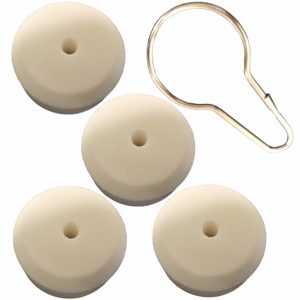
Some owners will place sale blocks or other minerals such as vitamin c tablets in their chinchillas drinking water.
Although hay and grass-based pellets should supply all the minerals your chinchilla needs.
You may have seen your chinchillas feeding on their droppings. This is common for chinchillas and is known as coprophagy.
While this might appear disgusting, it is natural for chinchillas to do this. Therefore, if your chinchilla is eating their droppings you don’t need to worry.
Chinchilla hay
Even when you choose a high fiber pelleted diet, it must still supply your chinchilla with hay so that they can get plenty of roughage (fiber).
The roughage in hay helps keep teeth in good condition and their digestive system functioning properly.
Feed as much good quality grass hay (orchard grass, Timothy-grass, etc) as your chinchillas want each day.
Hay should be cleaned out and fed fresh daily to keep it from becoming soiled or moldy.
If you’re struggling to find out what to feed your chinchilla, check out our complete feeding guide.
Pressed cubes of hay can be given, but it is recommended to feed loose hay still, as it has long strand fiber.
Adult chinchillas should not feed exclusively on alfalfa hay. Alfalfa is high in protein, calcium, and oxalates which means that too much could lead to urinary complications and other problems.
Don’t feed chinchillas any hay that is damp, smells musty, or is discolored, regardless of what kind it is.
Other Chinchilla Food Options
Pelleted diets are better than a mixture of loose items.
Loose mixes might be nutritionally balanced but your chinchilla may only eat part of the mix. (This is quite common). Therefore only consuming a part of the nutritional balanced.
Some people recommended feeding rabbit or guinea pig pellets to your chinchilla. This is highly unrecommended as rabbits and guinea pigs have different dietary requirements than chinchillas.
Chinchillas have specific dietary requirements that are different from other rodents, and their health will suffer if they are not fed quality chinchilla-specific food.
If you choose to feed a loose item mixture (with pellets, seeds, corn, etc.), keep in mind that there is a concern that feeding corn can cause digestive upset and bloat and many chinchilla foods.
Chinchilla Diet: Dos and Don’ts
Always ensure your chinchillas have clean drinking water and enough hay.
Replace hay regularly so that it does not form mold.
Avoid introducing sudden meals as they can make chinchillas sick. When switching their food you need to do it slowly. You should mix it in with your chinchilla’s current food and gradually increase it over a 10 – 14 day period.
Make sure they eat and drink every day and that their poop is dry.
Chinchillas are coprophages, this means they sometimes eat their poop. They do this to absorb extra nutrients.
Seeds and nuts should be avoided because they can make chinchillas sick due to the high amounts of fat.
How Much Do Chinchillas Eat?
Chinchillas require a constant supply of timothy hay and about two tablespoons of chinchilla pellets every day.
While they do not overeat, it is still a good idea to feed them small amounts of pellets at a time.
You can feed them one tablespoon in the morning and another one at dusk.
You can adjust the routine as you dim fit.
Some people feed their chinchillas only in the evening. Whichever routine you choose, be consistent with it because chinchillas love routines.
To prevent chinchilla’s food from getting soiled or dumped, use a heavy ceramic dish or a small food hopper to cover the food.
Hay racks are great for your chinchilla’s cage to hold the hay in as it stops it getting damp.
What You Shouldn’t Feed Your Chinchillas
Anything sugary or fatty is not good for your chinchillas. Chocolate is extremely dangerous for your chinchilla and needs to be avoided.
There are still some people who give chinchillas caffeine or alcohol. This is absurd, as it can easily kill your chinchillas. So, avoid such things completely.
Not sure whether safe
There are plenty of foods you can feed your chinchilla.
If you are not sure which food to give your chinchillas, do not risk it.
What Chinchilla Mixes Should I Feed My Chinchilla?
There are some chinchilla food mixes on the market. Feeding your chinchilla food mixes aren’t recommended as they sometimes contain a lot of treats.
Your chinchilla may also just want to eat part of the mix as they find that the might tasty.
As a result, your chinchillas will not get the right diet and nutrients required, despite eating too much sugar and fat.
Oxbow Animal Health Essentials Deluxe
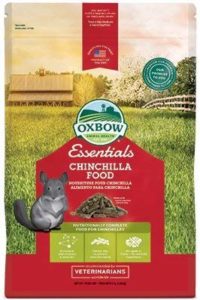
This chinchilla mix is perfect for your chinchillas because it helps to maintain their health and strengthen their immune system as well.
Chinchilla of all ages can consume it.
Young chinchillas can feed on unlimited amounts of grass hay and alfalfa, with a small number of pellets while adult chinchilla can take 1/8 to ¼ of a cup and hay.
The package comes in a large bag and can last you several months.
Higgins Sunburst Gourmet Mix
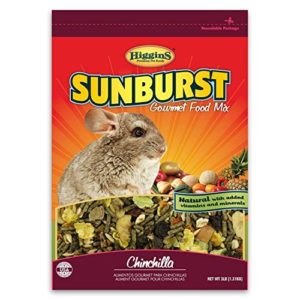
The Higgins sunburst gourmet mix comprises of different types of veggies and fruits.
It contains food and treats in the same package. This mix can promote your chinchilla’s health by boosting the immune system.
All the ingredients are natural and there are no preservative or flavors in the mix. The mix will encourage your chinchilla’s foraging instinct and improve their appetite.
Supreme petfoods science selective
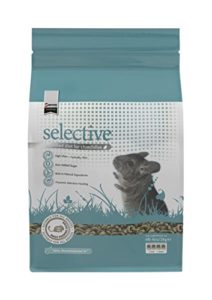
This chinchilla food contains a balanced diet and is rich in fiber. It is great for your chinchilla because it helps to keep their coat and skin healthy.
In addition, it is made of natural ingredients there are no added sugar or artificial colors, and therefore prevents your pets from being obese or from developing dental or indigestion issues.
Related Questions:
Can I feed my chinchilla rabbit food? Rabbits have different dietary requirements than chinchillas and their food shouldn’t be a substitute.
Can chinchillas eat bananas? No. Bananas contain a large amount of phosphorus and large amounts of sugars making it unsuitable for chinchillas. It can cause them stomach upsets because of the acidic and sugary content.
What are good treats for my chinchilla? Dried rose hips, hibiscus, and dandelion leaves all make wonderful treats.

